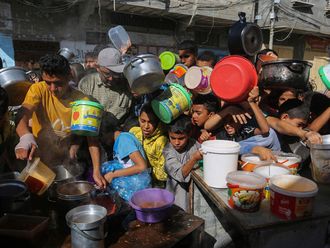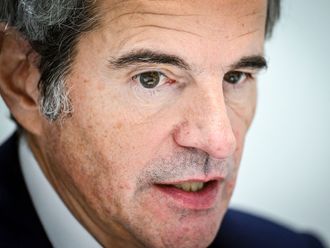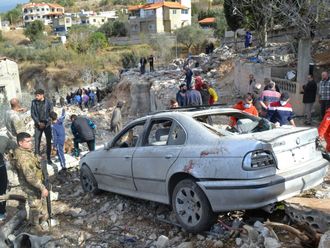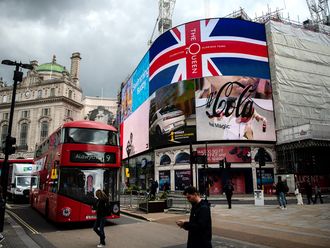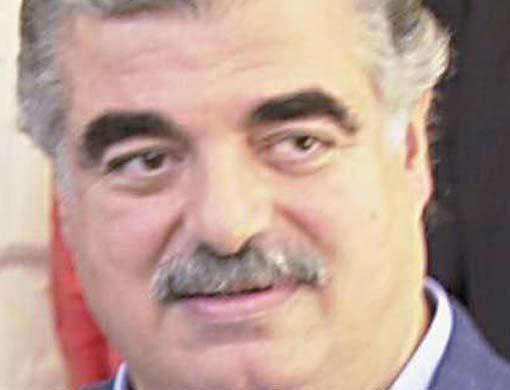
Beirut: Lebanon may be plunged into a political crisis which could bring down its coalition government if the UN tribunal investigating the killing of former premier Rafik Hariri indicts members of Hezbollah.
The Syrian- and Iranian-backed Hezbollah has strongly criticised the tribunal and said last month that the prosecutor's first indictment, expected to be issued in September or October, will blame some of its members.
Since then Hezbollah leader Hassan Nasrallah, who has been in hiding since the group's war with Israel in 2006, has repeatedly rejected any Hezbollah link to Hariri's killing, attacking the tribunal as an "Israeli project".
Analysts say Nasrallah is determined to deflect blame at any price, even if it leads to confrontation with Prime Minister Sa'ad Hariri, son of the slain billionaire politician.
The younger Hariri formed a national unity government last year which includes Hezbollah ministers. Just a year earlier a political crisis led to street fighting between Hezbollah and supporters of the pro-Western Hariri, in a brief echo of Lebanon's 1975-1990 civil war.
Leaders' dilemma
If the UN tribunal does go ahead with indictments of Hezbollah, members of the group, together with its Shiite and Christian allies, could decide to collapse the government.
"This time if they pull out of the government, the government will fall. They have the veto power this time," said Paul Salem, head of the Carnegie Endowment's Middle East centre.
The assassination of Rafik Hariri in 2005 pitched Lebanon into political and sectarian turmoil, dividing it into a pro-Syrian camp lead by Hezbollah, and an anti-Syrian and pro-Western camp headed by Sa'ad Hariri.
The following year Prime Minister Fouad Siniora approved plans to establish the tribunal, over objections from Hezbollah and its allies, prompting them to pull out of the government.
Eighteen months of political crisis ended in street fighting in May 2008 when Siniora's government tried to shut down a telephone network operated by Hezbollah, which called the move a declaration of war.
The crisis ended after talks in Qatar, but some Lebanese fear a repeat scenario if Hezbollah figures are indicted.
"[Hezbollah] has proven its strength and won, so beware of testing it again," Nasri Al Sayegh said in Assafir newspaper, referring to the street fighting in 2008 when Hezbollah supporters took over Beirut.
"If the indictment touches Hezbollah, and some in Lebanon cheered for it, then who knows where things will end up."
The Hezbollah warnings put Hariri in a thorny position. He either continues supporting the tribunal, even if it accuses the Shiite group, putting him on a collision course with Hezbollah. Or he denounces the UN investigation into his father's death, and risks losing international support and credibility.
"The question is: is there middle ground?" said Salem, adding that Nasrallah was warning that those who supported the tribunal "must be supporting Israel, which is a threat, meaning he can use force".
So far Hezbollah has shown no sign of backing down. Last month Nasrallah said Hariri told him privately the tribunal was going to indict "rogue members" of the group, but Nasrallah rejected any link at all between his members and the killing.
Joint visit
"Hariri cannot distance himself from the tribunal, and he cannot embrace it ... It's a kiss of death if he does," said Osama Safa, head of the Lebanese Centre for Policy Studies in Beirut, "The best thing to do if it comes out [is] to look the other way."
Alarmed by the heated political tension which surfaced after Nasrallah's first attack on the tribunal, the leaders of Saudi Arabia and Syria made a joint visit to Beirut last month.
"Saudi Arabia and Syria are the safety valve of Lebanon," said Jihad Al Zain, lead analyst at An Nahar newspaper. Saudi Arabia, along with its allies in Lebanon, supports the Hague-based court. Riyadh is among its main budget contributors.
Syria, initially implicated by UN investigators in the Hariri bombing, has always viewed the tribunal with suspicion, describing it as politically motivated.
On Monday, Nasrallah displayed what he said was Israeli surveillance footage which he said pointed to Israel carrying out Hariri's killing. The UN court responded by requesting the evidence he showed.
Safa said that might offer a window to postpone any looming indictments, giving time for tensions to ease.


